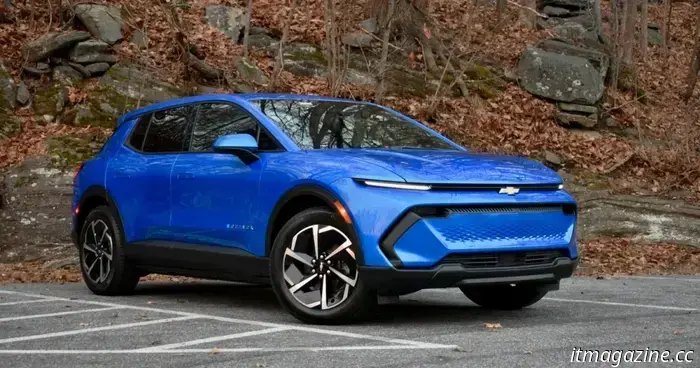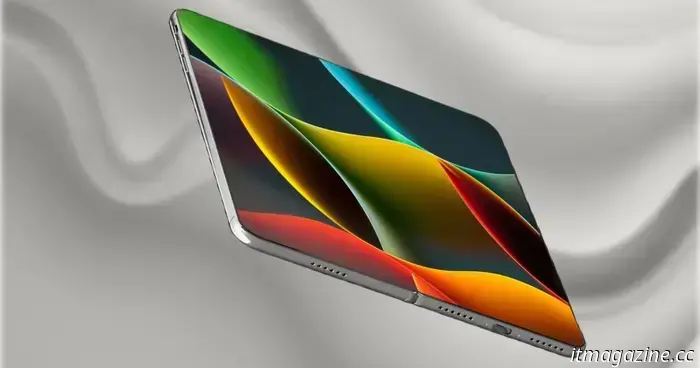
More affordable electric vehicles on the horizon? GM and LG assert that new battery cells are crucial.
Stephen Edelstein/Digital Trends
General Motors and LG Energy Solution have unveiled a new stage in their ongoing collaboration: the development of a new battery cell chemistry that has the potential to greatly reduce the cost of electric vehicles. This initiative focuses on lithium manganese iron phosphate (LMFP) battery cells, a variant of lithium iron phosphate (LFP) that is becoming popular due to its lower cost and reduced reliance on expensive materials such as nickel and cobalt.
This development is significant since battery expenses remain the largest single cost in the production of EVs. GM and industry specialists suggest that LMFP cells could bring the cost of electric vehicles close to, or even equal to, that of gasoline-powered cars. The objective is to make EVs more accessible to a wider array of consumers without compromising range or performance.
GM intends to implement these LMFP batteries in future Ultium-based electric vehicles, which is its modular electric platform for models like the Chevrolet Equinox EV and Blazer EV. These vehicles are priced between approximately $35,000 and $50,000, which still positions them higher than GM’s most popular internal combustion engine (ICE) vehicles, such as the gas-powered Equinox and Silverado, typically starting at around $28,000 and $36,000, respectively.
If LMFP batteries can lower EV prices, this disparity could diminish rapidly. This would be crucial for GM to achieve its long-term electric vehicle adoption goals while ensuring profitability. Unlike some more costly battery technologies, LMFP batteries are noted for their stability and cost-effectiveness, particularly when manufactured at scale. GM and LG assert that the production of these new cells will take place in the U.S., bolstering domestic supply chains and qualification for tax incentives.
In summary, this collaboration is not just a scientific experiment; it's a move towards addressing one of the most significant barriers in the EV market: affordability. If successful, it could herald a pivotal moment in the electric era, where selecting an EV no longer requires a premium payment.
Nick Godt has reported on global business news across three continents for over 25 years.
Chevrolet will cover charging-station installation costs for buyers of the 2022 Bolt EV
If you’re purchasing an electric vehicle, you will likely need a charging point. Chevrolet is aware of this and will pay for home-charging installation for buyers of the 2022 Bolt EV and Bolt EUV. However, this offer is only available until June and comes with specific conditions, according to InsideEVs.
Chevy, in partnership with Qmerit, will install a NEMA 14-50 outlet connected to a dedicated 50-amp circuit with its own breaker. This type of outlet is typically used for large appliances and enables Level 2 charging at 240 volts (as opposed to the standard 120-volt household outlet, which is considered Level 1). However, Chevy is only covering what it defines as a "standard installation," meaning any additional costs will fall on the customer.
Read more
2022 Chevy Bolt EV and Bolt EUV: More electric vehicles to love
As the first mass-produced electric vehicle offering over 200 miles of range at a price below $40,000, the first-generation Chevrolet Bolt EV was a significant step towards a zero-emission future. Nevertheless, Chevy cannot remain complacent. With competitors launching their own mass-market electric cars—encouraged by stricter global emissions regulations—the Bolt EV requires an update.
General Motors hasn’t just refreshed the Bolt EV; it has also introduced a new SUV-like option alongside the existing hatchback. The 2022 Chevrolet Bolt EUV will be available for sale alongside the 2022 Chevrolet Bolt EV this summer. The Bolt EUV is also the first non-Cadillac model to feature GM’s Super Cruise driver-assist technology, while the Bolt EV has received interior and exterior redesigns.
Read more
Uber collaborates with May Mobility to bring thousands of autonomous vehicles to U.S. roads
The race towards self-driving technology is accelerating, and Uber has just increased its capabilities. In a new multi-year collaboration, Uber and autonomous vehicle (AV) company May Mobility will begin rolling out driverless rides in Arlington, Texas by 2025, with plans for thousands of additional vehicles across the U.S. in the upcoming years.
Uber has already made significant progress in making autonomous ride-hailing a common option. The company already partners with Waymo, which operates robotaxis in several cities, and is now integrating May Mobility’s hybrid-electric Toyota Sienna vans onto its platform. Initially, these vehicles will operate with safety drivers but are expected to transition to full autonomy as the deployments expand.
May Mobility is well-established in this field. Supported by Toyota, BMW, and other major investors, it has been delivering AV services in designated areas since 2021. Its AI-driven Multi-Policy Decision Making (MPDM) technology enables quick and safe responses to unpredictable real-world scenarios—help





Other articles
 Maya Hawke from Stranger Things is set to join the upcoming Hunger Games film.
Maya Hawke is set to portray a younger version of a character from an earlier Hunger Games film.
Maya Hawke from Stranger Things is set to join the upcoming Hunger Games film.
Maya Hawke is set to portray a younger version of a character from an earlier Hunger Games film.
 NYT Crossword: solutions for Thursday, May 15
NYT Crossword: solutions for Thursday, May 15
 YouTube has begun employing AI to make ads increasingly hard to skip.
YouTube is experimenting with new ad placements that make it harder to skip them.
YouTube has begun employing AI to make ads increasingly hard to skip.
YouTube is experimenting with new ad placements that make it harder to skip them.
 Apple Maps will now assist you in enjoying a meal at upscale restaurants alongside golfing.
Apple Maps is introducing a new feature that will assist users in locating Michelin-rated restaurants, nearby golf courses, and making reservations.
Apple Maps will now assist you in enjoying a meal at upscale restaurants alongside golfing.
Apple Maps is introducing a new feature that will assist users in locating Michelin-rated restaurants, nearby golf courses, and making reservations.
 The newest leak regarding the iPhone Fold lends support to earlier rumors about its design feature.
A recent report has provided additional information regarding the screen ratios and front camera of the speculated iPhone Fold.
The newest leak regarding the iPhone Fold lends support to earlier rumors about its design feature.
A recent report has provided additional information regarding the screen ratios and front camera of the speculated iPhone Fold.
 The prequel to Game of Thrones, titled A Knight of the Seven Kingdoms, has been postponed until 2026.
Will there be two Game of Thrones series in 2026?
The prequel to Game of Thrones, titled A Knight of the Seven Kingdoms, has been postponed until 2026.
Will there be two Game of Thrones series in 2026?
More affordable electric vehicles on the horizon? GM and LG assert that new battery cells are crucial.
GM and LG Energy are working together on a new battery cell technology aimed at reducing the cost of electric vehicles.
